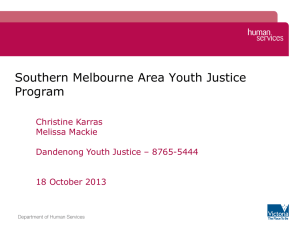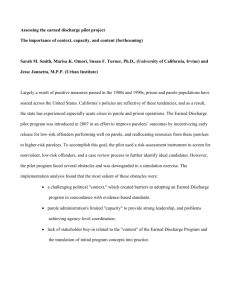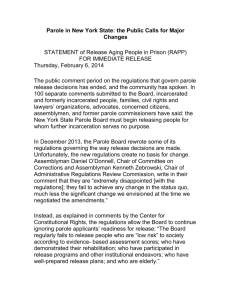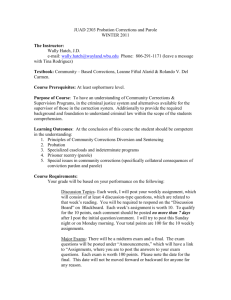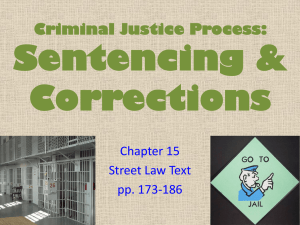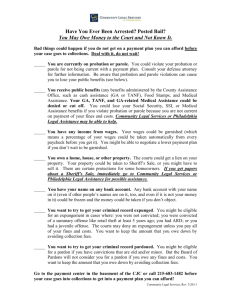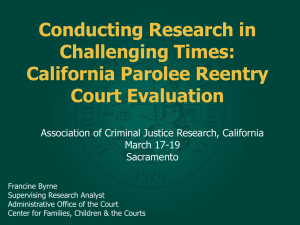Parole
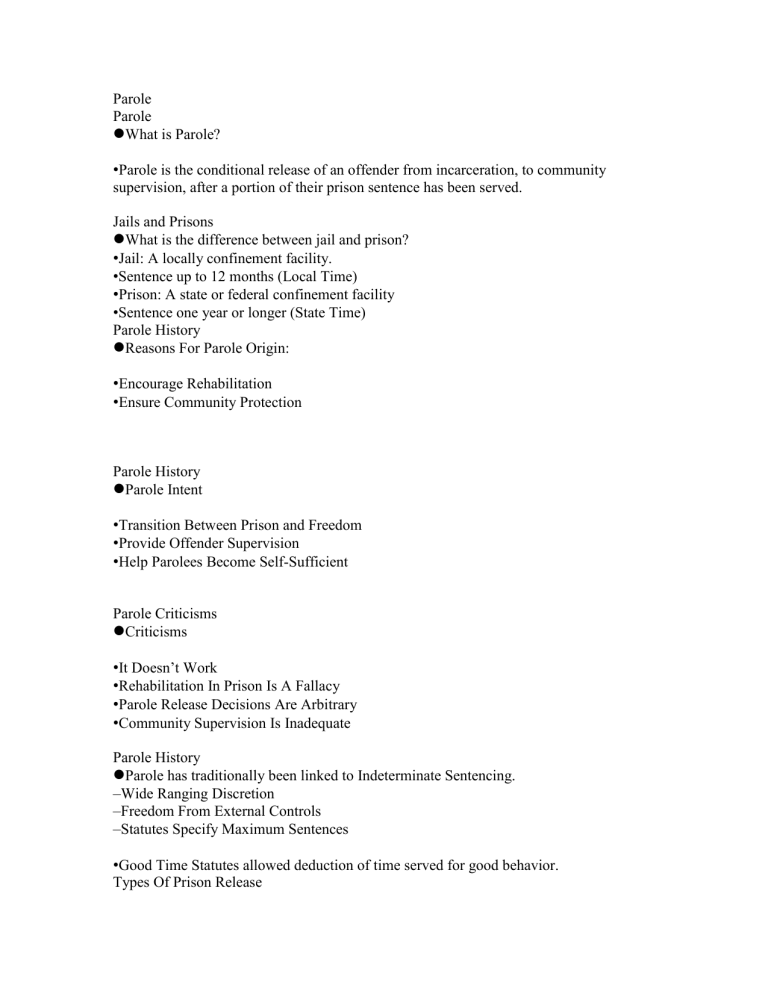
Parole
Parole
What is Parole?
•
Parole is the conditional release of an offender from incarceration, to community supervision, after a portion of their prison sentence has been served.
Jails and Prisons
What is the difference between jail and prison?
•
Jail: A locally confinement facility.
•Sentence up to 12 months (Local Time)
•
Prison: A state or federal confinement facility
•Sentence one year or longer (State Time)
Parole History
Reasons For Parole Origin:
•
Encourage Rehabilitation
•
Ensure Community Protection
Parole History
Parole Intent
•
Transition Between Prison and Freedom
•
Provide Offender Supervision
•
Help Parolees Become Self-Sufficient
Parole Criticisms
Criticisms
• It Doesn’t Work
•
Rehabilitation In Prison Is A Fallacy
•
Parole Release Decisions Are Arbitrary
•
Community Supervision Is Inadequate
Parole History
Parole has traditionally been linked to Indeterminate Sentencing.
–Wide Ranging Discretion
–Freedom From External Controls
–Statutes Specify Maximum Sentences
•
Good Time Statutes allowed deduction of time served for good behavior.
Types Of Prison Release
• Conditional (AKA: Discretionary)
•Parolee released with some portion of the sentence not served
• Mandatory
•Parolee released early, usually 4-6 month sentence remaining, by legislative requirement
• Unconditional
•Parolee serves entire sentence and is released without parole
Important Terminology
Minimum Expiration Date (MED)
•
MED is the date the parole obligation is complete.
•The minimum expiration date from supervision is January 1, 2010.
Parolee Adjustment Problems
•
Parolees face different adjustment problems than probationers.
•Readjustment to Freedom, Job, Family
•Longer prison sentence, less likely to have support system waiting when released
Parolee Adjustment Problems
•
Most offenders leave prison with the same problems they had when they went to prison
–Drugs
–Alcohol
–Emotional
–Interpersonal
–Educational
–Employment
Civil Liberties
•
Felons lose some civil liberties.
•
They are called Civil Disabilities.
•Right to Vote
•Right to Hold Public Office
•Right to Bear Arms
• Omnibus Gun Control Act 1968 and 1972
•Some Occupational Licensures
Argument
Parole, like prison, is supposed to change a person, making them less likely to re-offend and more likely to survive in society.
Some argue to abolish parole.
Why not argue to abolish prison?
It doesn’t work to improve behavior.
Parole Abolition
•
Parole has been abolished in 17 states.
•Get-Tough Era of Corrections
Parole Abolition
•
Has parole been abolished in Virginia?
•
Is parole still granted in Virginia?
Parole Abolition
•
Has parole been abolished in Virginia?
•
Is parole still granted in Virginia?
•
Parole has been abolished in Virginia.
•
Parole is still granted in Virginia.
•Cases sentenced prior to parole abolition
•Multiple misdemeanors resulting in state time
Parole Administrative Structure
•
Three Types
•
Institutional Model
•
Autonomous Model
•
Consolidated Model
Parole Administrative Structure
•
Institutional Model
•The Preferred Juvenile Model
•“Prison Officials In Best Position To Know”
Parole Administrative Structure
•
Autonomous Model
•Separate Agency Independent of Corrections
•Supposedly More Objective Decision Process
Parole Administrative Structure
•
Consolidated Model
•Combination of Both Prior Models
•Institutional Personnel Input But Not Decision
•Most Common Adult Correctional Model
• Model Used in Virginia
Reality
•
If parole was abolished in Virginia, why would legislators re-institute it under other names?
•Reason: The need to appear tough on crime.
•Is this ethical leadership?
•Does it say politicians lack faith in the public’s ability to make informed decisions?
Parole Grant Rates
•
National Parole Grant Rates
•1977 72%
•1988 About 40%
•
Virginia Parole Grant Rates
•1988 42%
•1995 8%
•2001 About 8%
Parole Grant Rates
•
Parole decisions are made by Parole Boards.
•Most Parole Boards are appointed by Governors.
•Parole Board members are gubernatorial appointees.
Parole Bias and
Public Responsibility
•
Virginia parole grant rate when Gov. George Allen took office was 42%.
•
Gov. Allen appointed a new Parole Board. The grant rate immediately dropped to 6%.
•
Richmond Times Dispatch ran the story.
•
The grant rate immediately rose to 15%.
Parole Bias and
Public Responsibility
•
Fact: Probation and Parole are at least as effective as prison at reducing recidivism.
•
Fact: CBC with TX costs less than prison and greatly reduces recidivism.
•
It is good public stewardship to confine all offenders for 85% of their sentence?

